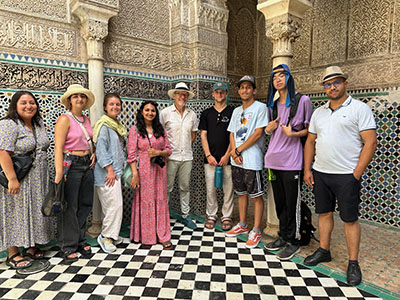Campus News
UC Santa Cruz launches new Middle Eastern and North African Studies Minor
Starting this fall, a new interdisciplinary minor in Middle Eastern and North African Studies will immerse undergraduates in the region’s languages, culture, politics and history. The minor will be housed in the Humanities Division at UC Santa Cruz.

Launching this fall, UC Santa Cruz’s new Middle Eastern And North African Studies (MENA) minor will immerse undergraduates in the language, culture, politics and history of the region.
UC Santa Cruz Associate Professor of History Jennifer Derr has noticed a consistent push for courses about the Middle East and North Africa over the past ten years, as well as a strong demand for language courses focusing on those areas.
“Courses about the region are usually packed with enthusiastic students,” said Derr, who started teaching at UC Santa Cruz in 2012. “In the time since I’ve been here, there has been consistent student interest in building more formal programs that center Southwest Asia – the Middle East – and North Africa. This is a tremendous opportunity to respond to that energy and build an academic community of students from different departments in order to enhance their education.”
“This is an exciting moment,” Derr said, referring to the imminent launch of the minor. “The minor will highlight the breadth and strength of faculty research across different departments to give students the courses and the educational opportunities that they have been asking for.”
Derr, Founding Director of the Center For The Middle East And North Africa (CMENA), which launched in 2019, said that pursuing this minor can help students explore the synergies between their primary fields of interest and secondary subjects.
Sometimes, that sense of openness can influence career decisions, said Derr, noting that she pursued a major in biological sciences during her undergraduate years at Stanford, with a minor in history, before going on to study history in graduate school, also at Stanford.
Derr is the author of The Lived Nile: Environment, Disease And Material Colonial Economy In Egypt (Stanford University Press.) She is the recipient of the National Science Foundation Early Career Award and a $225,000 Andrew W. Mellon Foundation humanities grant supporting “Race, Empire, and the Environments of Biomedicine,” a Sawyer Seminar on the Comparative Study of Culture.
The MENA minor also reflects the campus’s longstanding commitment to top-notch research and scholarship focusing on the Middle East and North Africa, said Humanities Dean Jasmine Alinder. “When it comes to research and scholarship focused on those regions, particularly North Africa, we are one of the leading universities in the UC system and in the United States,” Alinder said.
“We are also committed to developing new pathways in undergraduate and graduate education and professional development,” Alinder said. “For our students, equity necessitates opening the globe and expanding horizons of imagination and possibility, as well as supporting the acquisition of tangible and useful skills, which the MENA minor will give them.”
CMENA is a project of The Humanities Institute at UCSC (THI), which is housed in the Humanities Division. CMENA is a hub for academic research, cross-disciplinary collaboration, and public engagement. Affiliated scholars study politics, economics, race, law, the environment, film, literature, linguistics, archeology, the digital humanities, and the histories of science and medicine.
This new MENA minor will also provide strong institutional support for undergraduates who are already taking classes focusing on the Middle East and North Africa, while encouraging other students to delve into the region’s history and culture, Derr said.
As the state of California is home to historic and sizable communities with roots in the Middle East and North Africa, the minor will also give students a richer understanding of the diverse histories of Californians.
The minor, which will be housed in the Humanities Division, has a strong interdisciplinary focus. Affiliated faculty include Derr, Muriam Haleh Davis, Alma Heckman, and Elaine Sullivan (all in History), as well as Martin Devecka (Literature), Camilo Gomez-Rivas (Literature), Jennifer Mogannam (Critical Race and Ethnic Studies), Yasmeen Daifallah (Politics), Thomas Serres (Politics), Ashwak Hauter (Anthropology), Maria Evangelatou (History of Art and Visual Culture), and Peter Limbrick (Film and Digital Media).
This minor will be one of a small number of programs at UCSC that build foreign languages into the curriculum.
To complete the minor, students will have to complete at least three quarters of a Middle Eastern language. UCSC offers classes in Arabic, Farsi, and Hebrew. In addition, students must take minor-affiliated courses in at least three different departments.
“Giving students an incentive to study language is one way of helping them graduate with tangible skills, especially because language study is integrated into a curriculum that also includes the history, politics and culture of the region,” Derr said.